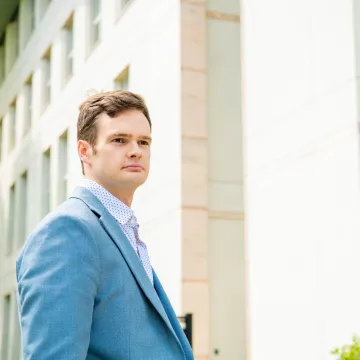Biography
By 2022, Cameron Bard had already seen success in his career. He had an engineering job with one of the world’s largest aerospace and defense manufacturers, and by his own admission didn’t feel further education was essential to move forward with his career. And yet, later that year, he made the decision to leave the security of the company where he’d worked for more than three years and enroll in an MBA program.
What drove Cameron to leave the engineering world was a desire to move from a career as a technical expert to one that involved more generalist management expertise. “As an engineer, you're not really exposed to larger strategic concepts—how the company actually makes money, its services, its shareholders, or how it works with customers,” he explains.
Despite working in aerospace, he also had a keen interest in the energy and industrial sectors and had a desire to work more closely with the transition to clean energy and decarbonization. Enrolling in an MBA would allow him to explore more opportunities.
While planning his next steps Cameron was able to spend time on the Emory campus, where he mixed with students and faculty and gained an insight into life in the Goizueta MBA. “I think what drew me the most was the small class size which allows you to develop really close relationships with faculty members,” he says. With the school boasting faculty members who hold expertise across a range of sectors, including energy, Cameron was attracted to the opportunity to work closely with professors who could share their expertise and help direct his career.
The Goizueta MBA places significant emphasis on practical learning experiences, something Cameron took full advantage of. He took part in a series of optional case competitions against other business schools, including national competitions which involved solving problems for real companies. “You get the opportunity to take a real problem they have and build a set of solutions, give them recommendations, and then present it literally to the client. So it's almost like you're doing an actual case study, but just in a low risk environment,” he says.
Alongside this, he took the opportunity to work on a specialized directed study with Goizueta finance professor Ray Hill—a former energy sector executive—where he delved into the energy sector and the cost of nuclear power generation facilities in the US.
“Those were really interesting and meaningful opportunities for me,” he says.
While the variety of opportunities available helped enhance his business understanding and build his academic credentials, for Cameron, arguably more important was the personal journey he underwent during the MBA. “It took some time to come out of my comfort zone, but I gradually discovered that I am a lot less introverted than I originally thought of myself; I became a lot more extroverted,” he explains.
This was an important discovery which helped when he embarked on a three-month internship with Boston Consulting Group during the summer between his first and second years.
As a summer associate, he took on the generalist role of a consultant, employing the theoretical and industry-specific knowledge he’d gained during his first year of MBA studies as he worked closely with a team of consultants on a project for a client in the energy sector.
It was shortly after taking a lead role on a client presentation when he was offered the opportunity to return in a full-time role, with his manager citing the confident way he had commanded the presentation material as one of the ways he had impressed.
As he embarks on his new career path with BCG, Cameron feels the business knowledge and skills he learned have prepared him to pivot careers. Though, he reflects that for technical professionals looking to pivot their careers, the social side of an MBA is equally as important. “Understand the importance of connecting with people and realize that your social capital is going to be just as important as your intellectual capital,” he advises.
